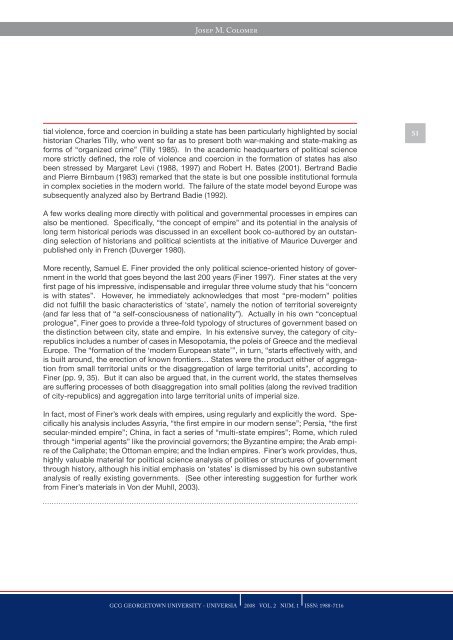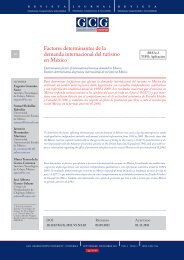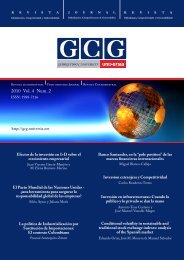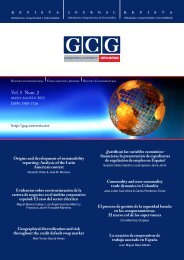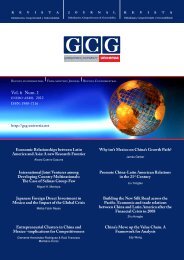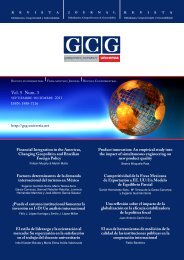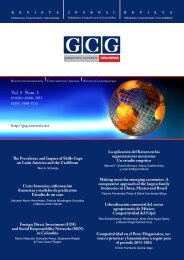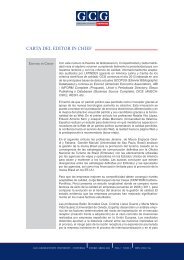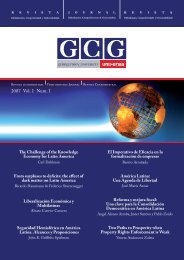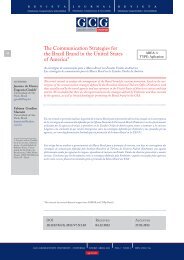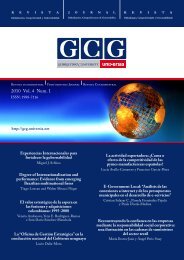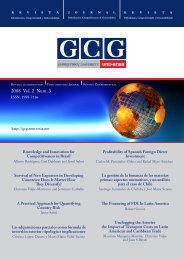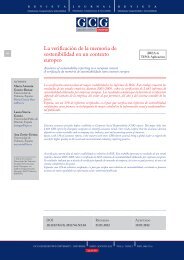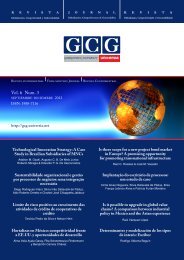Bringing the Empire Back In50political system and the state itself. Analogously, the <strong>de</strong>velopment of studies directly orindirectly inspired on the assumption of state centrality has contributed to pay attentionto alternative political units with an impact on states. In recent times scholars of the statehave realized that the state cannot be taken for granted; its very existence is problematic;processes of state-building and nation-building show that there are different <strong>de</strong>grees of‘statehood’ or ‘stateness’; there are strong and weak states, as well as numerous failed‘states’; and the future of the national state in the current world is questioned by new issuesof scale, space and territoriality. Both supra-state and infra-state institutional and organizationalstructures appear increasingly relevant to explain collective processes and outcomesin the current world.Empire-wi<strong>de</strong> political and institutional processes in<strong>de</strong>ed disappeared from the field of aca<strong>de</strong>micpolitical studies after the Second World War. A search in the American PoliticalScience Review (APSR) since its foundation gives the following results. In the first period,from 1903 to 1949, as many as seven articles and 74 books reviewed inclu<strong>de</strong>d the words‘empire’ or ‘imperial’ in the title. Most of them <strong>de</strong>alt with the “problems and possibilities”(as titled in one of the reviews) of the British empire, followed by the German empire, aswell as the American, Chinese, Japanese and Ottoman empires. Articles and books approachedsuch suggestive subjects as empire’s unity, nationalism, fe<strong>de</strong>ralism, government andpolitics, political system, governance, constitution and laws, legislative jurisdiction, administrativesystem, civil service or civil co<strong>de</strong> --that is, the same kind of subjects that can bestudied un<strong>de</strong>r the alternative framework of ‘state’.In contrast, not a single piece of work published in the APSR between 1950 and 1967 inclu<strong>de</strong>dthe words ‘empire’ or ‘imperial’ in the title. This suggests that “society-centered”approaches which were prevalent during that period, at the same time that neglected thestudy of states did also forget the study of empires. Since 1968, the words ‘empire’ or ‘imperial’reappear, although only in 40 book reviews, not in the titles of full-fledged articles.Most of the reviews in this period focus on history of past colonial empires, while only eightaddress imperial relations in the current world (mainly regarding American foreign affairs).1A new source of interest in the concept of empire can be <strong>de</strong>rived, however, from state-centeredstudies in state-building and nation-building. Two generations of political scientistsago, some fundamental discussion was collected by S. N. Eisendstadt and Stein Rokkan(1973). As they were embed<strong>de</strong>d in the ‘mo<strong>de</strong>rnization’ paradigm, the editors acknowledgedthey had been unable of “<strong>de</strong>veloping a general theoretical structure for comparisonsacross all regions of the world”, but remarked on “the uniqueness of the Western experienceof state formation and nation-building” and its inappropriateness for the “Third World”.Specifically for Africa, for instance, “nation-building in the European style was a luxury whennot a catastrophe”. (See also Rokkan and Urwin, 1983).Somehow following or paralleling this intuition, a number of historians have i<strong>de</strong>ntified spatialand temporal limits for the validity of the concept of ‘state’: basically Western Europe anda few of its colonies since mid-17th century to late 20th century. A masterful survey of themo<strong>de</strong>rn states in this perspective is given, for example, by Martin L. Van Creveld (1999).Other enlightening studies on the formation of early states inclu<strong>de</strong> William Doyle (1978),Charles Tilly (1975); Hendrik Spruyt (1994) and Philip Bobbitt (2002). The importance of ini-<strong>GCG</strong> GEORGETOWN UNIVERSITY - UNIVERSIA <strong>2008</strong> VOL. 2 NUM. 1 ISSN: 1988-7116
Josep M. Colomertial violence, force and coercion in building a state has been particularly highlighted by socialhistorian Charles Tilly, who went so far as to present both war-making and state-making asforms of “organized crime” (Tilly 1985). In the aca<strong>de</strong>mic headquarters of political sciencemore strictly <strong>de</strong>fined, the role of violence and coercion in the formation of states has alsobeen stressed by Margaret Levi (1988, 1997) and Robert H. Bates (2001). Bertrand Badieand Pierre Birnbaum (1983) remarked that the state is but one possible institutional formulain complex societies in the mo<strong>de</strong>rn world. The failure of the state mo<strong>de</strong>l beyond Europe wassubsequently analyzed also by Bertrand Badie (1992).51A few works <strong>de</strong>aling more directly with political and governmental processes in empires canalso be mentioned. Specifically, “the concept of empire” and its potential in the analysis oflong term historical periods was discussed in an excellent book co-authored by an outstandingselection of historians and political scientists at the initiative of Maurice Duverger andpublished only in French (Duverger 1980).More recently, Samuel E. Finer provi<strong>de</strong>d the only political science-oriented history of governmentin the world that goes beyond the last 200 years (Finer 1997). Finer states at the veryfirst page of his impressive, indispensable and irregular three volume study that his “concernis with states”. However, he immediately acknowledges that most “pre-mo<strong>de</strong>rn” politiesdid not fulfill the basic characteristics of ‘state’, namely the notion of territorial sovereignty(and far less that of “a self-consciousness of nationality”). Actually in his own “conceptualprologue”, Finer goes to provi<strong>de</strong> a three-fold typology of structures of government based onthe distinction between city, state and empire. In his extensive survey, the category of cityrepublicsinclu<strong>de</strong>s a number of cases in Mesopotamia, the poleis of Greece and the medievalEurope. The “formation of the ‘mo<strong>de</strong>rn European state’”, in turn, “starts effectively with, andis built around, the erection of known frontiers… States were the product either of aggregationfrom small territorial units or the disaggregation of large territorial units”, according toFiner (pp. 9, 35). But it can also be argued that, in the current world, the states themselvesare suffering processes of both disaggregation into small polities (along the revived traditionof city-republics) and aggregation into large territorial units of imperial size.In fact, most of Finer’s work <strong>de</strong>als with empires, using regularly and explicitly the word. Specificallyhis analysis inclu<strong>de</strong>s Assyria, “the first empire in our mo<strong>de</strong>rn sense”; Persia, “the firstsecular-min<strong>de</strong>d empire”; China, in fact a series of “multi-state empires”; Rome, which ruledthrough “imperial agents” like the provincial governors; the Byzantine empire; the Arab empireof the Caliphate; the Ottoman empire; and the Indian empires. Finer’s work provi<strong>de</strong>s, thus,highly valuable material for political science analysis of polities or structures of governmentthrough history, although his initial emphasis on ‘states’ is dismissed by his own substantiveanalysis of really existing governments. (See other interesting suggestion for further workfrom Finer’s materials in Von <strong>de</strong>r Muhll, 2003).<strong>GCG</strong> GEORGETOWN UNIVERSITY - UNIVERSIA <strong>2008</strong> VOL. 2 NUM. 1 ISSN: 1988-7116
- Page 1 and 2: Revista cuatrimestral Four-monthly
- Page 3 and 4: En el segundo artículo, Andrés Op
- Page 6 and 7: SUMARIO SUMMARY SUMÁRIO1ÚAmérica
- Page 8 and 9: StaffUniversity, EEUUEdwards, Sebas
- Page 10: StaffMario Cimoli, Technology and i
- Page 13 and 14: Libros: Dornier, P.P.; Ertns, R.; F
- Page 15 and 16: GCG- Each article will be submitted
- Page 17 and 18: GCGGCG GEORGETOWN UNIVERSITY - UNIV
- Page 19 and 20: 1. América Latina: la coyuntura ac
- Page 21 and 22: Bernardo Kosacoff y Andrés LopezAc
- Page 23 and 24: Bernardo Kosacoff y Andrés Lopezso
- Page 25 and 26: Bernardo Kosacoff y Andrés Lopez3.
- Page 27 and 28: Bernardo Kosacoff y Andrés Lopezva
- Page 29 and 30: Bernardo Kosacoff y Andrés Lopezaf
- Page 31 and 32: Bernardo Kosacoff y Andrés LopezBi
- Page 33 and 34: Bernardo Kosacoff y Andrés Lopez33
- Page 35 and 36: United States and Europe have becom
- Page 37 and 38: Andres Oppenheimer2,800, Chile 1570
- Page 39 and 40: Andres Oppenheimer39GCG GEORGETOWN
- Page 41 and 42: experiments we quantified the destr
- Page 43 and 44: Hilda Ochoa-Brillembourgallow more
- Page 45 and 46: Hilda Ochoa-Brillembourg1.3. Help C
- Page 47 and 48: Hilda Ochoa-Brillembourg2. Why the
- Page 49: with a number of empires in other h
- Page 53 and 54: Josep M. ColomerIn contrast, ‘sta
- Page 55 and 56: Josep M. Colomeroverlapping institu
- Page 57 and 58: Josep M. ColomerReferences57Badie,
- Page 59 and 60: Josep M. Colomer59GCG GEORGETOWN UN
- Page 61 and 62: países con regimenes democráticos
- Page 63 and 64: Beatriz M. Ramacciottiel ámbito mu
- Page 65 and 66: Beatriz M. Ramacciottimiembro de lo
- Page 67 and 68: Beatriz M. RamacciottiEl nuevo esce
- Page 69 and 70: Beatriz M. RamacciottiComo dicen al
- Page 71 and 72: Beatriz M. Ramacciottiobservaciones
- Page 73 and 74: Beatriz M. Ramacciotti73GCG GEORGET
- Page 75 and 76: del entorno global (Prats i Catalá
- Page 77 and 78: Manuel F. Suarez-Barraza y Juan Ram
- Page 79 and 80: Manuel F. Suarez-Barraza y Juan Ram
- Page 81 and 82: Manuel F. Suarez-Barraza y Juan Ram
- Page 83 and 84: Manuel F. Suarez-Barraza y Juan Ram
- Page 85 and 86: Manuel F. Suarez-Barraza y Juan Ram
- Page 87 and 88: Manuel F. Suarez-Barraza y Juan Ram
- Page 89 and 90: de los países del mundo, utilizan
- Page 91 and 92: Daniel Correa SabatPor su parte, y
- Page 93 and 94: Daniel Correa SabatPara efectos de
- Page 95 and 96: Daniel Correa Sabaten la contrataci
- Page 97 and 98: Daniel Correa Sabaten definitiva, g
- Page 99 and 100: Daniel Correa SabatReferencias99ANG
- Page 101 and 102:
filantropía a nivel local, son tod
- Page 103 and 104:
Francesco D. Sandulli3. Estrategias
- Page 105 and 106:
Francesco D. SandulliTabla 1: Medic
- Page 107 and 108:
Francesco D. SandulliTal y como se
- Page 109 and 110:
Francesco D. SandulliEn el segundo
- Page 111:
Francesco D. SandulliBibliografía1


